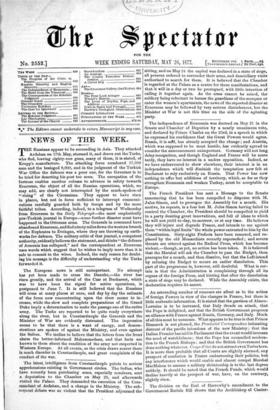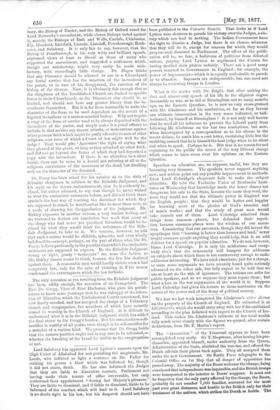The division on the Earl of Harrowby's amendment to the
Government Burials Bill shows that the Archbishop of Canter- bury, the Bishop of Exeter, and the Bishop of Oxford voted for Lord Harrowby's amendment, while eleven bishops voted against it, namely, the Bishops of Bath and Wells, Carlisle, Chichester, Ely, Hereford, Lichfield, Lincoln, Llandaff, Peterborough, Roch- ester, and Salisbury. It is only fair to say, however, that the Bishop of Peterborough, in his very witty and brilliant speech, expressed views at least as liberal as those of many who supported the amendment, and suggested a settlement which, though not satisfactory, might very easily be made satis- factory, with exceedingly little change. Dr. Magee thinks that any Dissenter should be allowed to use in a Churchyard any burial service that has the sanction of the incumbent of the parish, or in case of his disapproval, the sanction of the bishop of the diocese. Now, it is obviously fair enough that as the clergymen of the Established Church are limited to specific forms in their Churchyards, so the Dissenters also should be so limited, and should not have any greater liberty than the in- cumbents themselves. But it is far from reasonable to make the character of the form to be used dependent on the assent of a bigoted incumbent or a narrow-minded bishop. Why not require a copy of the form of service used to be always deposited with the incumbent of the parish, and simply make it a penal offence to include in that service any sneers, attacks, or insinuations against other persons' faith which might be justly offensive to men of other religions,—an issue of which a Court of law might well be the judge ? That would give 'Agnostics ' the right of saying what they pleased at the grave, so long as they attacked no other faith, and did not go beyond the forms of which they had deposited a copy with the incumbent. If there is no objection to a silent burial, there can be none to a burial not referring at all to the religious convictions of the mourners or the dead, but dwelling only on the character of the deceased.



































